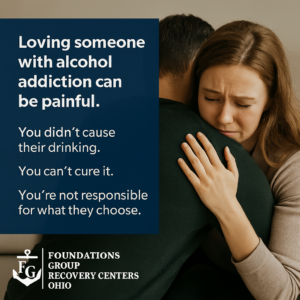When someone you love is caught in alcohol addiction, it can feel like you’re drowning beside them. You want to help. You don’t want to walk away. But you also can’t keep losing yourself in the process.
This is the silent crisis so many partners, spouses, and family members face. You love someone deeply—and their drinking is tearing both of you apart.
If you’re in this space, here are some of the most common, emotionally loaded questions that come up. You’re not alone in asking them.
Can I really love them and still set boundaries?
Yes—and sometimes, setting boundaries is the most loving act you can offer. Loving someone doesn’t mean tolerating everything that comes with their addiction. It means caring enough to protect what matters: your safety, your clarity, and your sanity.
Boundaries say: “I love you, and I love me too.”
Here are some examples:
- “I won’t cover for you anymore when you miss work due to drinking.”
- “I won’t stay in the room if you’re drinking.”
- “If you come home intoxicated, I’ll need to stay elsewhere.”
Boundaries aren’t about control. They’re about survival. They give you something to hold onto in a situation that often feels like it’s slipping through your hands.
What if they get help just to keep me from leaving?
That happens. And it’s okay to feel unsure about their motivation. But change doesn’t have to start perfectly to work. For many, the first step into treatment is about keeping a relationship. But if they stay and do the work, recovery can become about something deeper—their own healing.
You can ask questions like:
- “What kind of help are you open to?”
- “Do you want this for yourself or just for me?”
- “Are you willing to keep going even if I step back?”
Not all “wrong reasons” stay wrong. Sometimes, they open the door to something real.
Why do I feel so guilty all the time?
Because you care. Because love makes us question ourselves even when we’re doing our best. Guilt is part of this process, but it doesn’t always mean you’re doing something wrong.
Here’s what guilt might sound like:
- “If I leave, they might spiral.”
- “If I stay, I’m enabling them.”
- “No matter what I do, I feel like I’m failing.”
Let this be a reminder:
- You didn’t cause their drinking.
- You can’t cure it.
- You’re not responsible for what they choose.
Guilt loses its power when we name it. You are allowed to care deeply and protect your own well-being.

How do I know when it’s time to walk away?
There’s no universal sign. But many people reach a moment when staying becomes more damaging than leaving. That moment doesn’t always come with clarity. Sometimes it comes with a whisper: “I can’t do this anymore.”
Ask yourself:
- Do I feel emotionally safe in this relationship?
- Am I sacrificing my mental or physical health?
- Have I lost touch with my own goals, friends, or peace?
Leaving doesn’t mean you don’t love them. It means you’re choosing to love yourself, too. And in some cases, it can be the catalyst for real change.
Is there help for me, not just them?
Yes. And you deserve it. Loving someone with an addiction can create its own kind of trauma—isolation, anxiety, depression, burnout.
You can find support through:
- Family therapy
- Al-Anon or similar groups
- Individual counseling
These aren’t just about coping with them. They’re about reclaiming you.
At Foundations Ohio, we work with families too. Because healing isn’t just for the person using. It’s for everyone affected.
💬 What People Say
“I thought love meant staying no matter what. Now I know love also means saying ‘enough.'”
– Partner of someone in early recovery
“Therapy helped me see I wasn’t crazy—I was just living in a situation that hurt.”
– Family support group member, 2024
FAQ: Loving Someone in Active Alcohol Addiction
Q: Is it wrong to hope they get better if I stay?
No. Hope is not wrong. But hope doesn’t have to come at the expense of your peace. It’s okay to hope and take space.
Q: What if they get angry when I set boundaries?
They might. Addiction often resists anything that threatens it. That doesn’t mean your boundary is wrong. It means it’s working.
Q: Can someone recover even if they don’t think they have a problem?
Change can begin in many ways—but true recovery usually starts when someone acknowledges they need help. Sometimes that moment takes time.
Q: Should I stay until they hit rock bottom?
“Rock bottom” is not a requirement for recovery. It’s a myth that things have to get worse before they get better. Your voice and limits might be the wake-up call they need.
Q: How can I talk to them about getting treatment?
Choose a calm moment. Speak from your heart, not from blame. Try: “I love you. And I’m scared. I think you deserve help.”
📞 Ready to Talk About It?
You don’t have to make a decision today. You don’t have to stop loving them. But you can start getting the support you need.
Call us at (888) 501-5618. We’ll help you figure out what comes next—together.
Imp. Links:
